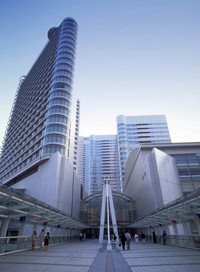JMC in Bloomberg News about Real Estate
Eric Perraudin, JMC managing partner, is quoted as an expert of real estate in a Bloomberg News article published in the International Herald Tribune.
Japanese property is rebounding
 International Herald Tribune / Bloomberg News
International Herald Tribune / Bloomberg News
2005/3/31
By Jag Dhaliwall and Mariko Yasu Bloomberg News
(by courtesy of Bloomberg News)Low interest rates spur foreign investors to purchase assets
TOKYO Morgan Stanley and Goldman Sachs Group, Wall Street’s biggest real estate investors, are among global companies plowing more than $7 billion into Japan as property prices recover from a 15-year slide.
.
Morgan Stanley Real Estate, which manages $29 billion, has spent $2.5 billion in Japan in the past six weeks to buy assets that include the closely held Shuwa, owner of 16 office buildings in Tokyo, according to a person involved in the transactions who declined to be identified.
.
Goldman in March bought a lending business from UFJ Holdings, Japan’s fourth-largest bank, gaining ¥45 billion, or $418.5 million, of loans backed by gaming parlors, short-stay hotels and golf courses.
.
Commercial property prices climbed in Tokyo’s five main business districts in 2004 for the first time since Japan’s bubble economy burst 15 years ago, bringing down real estate values by 75 percent. Rising rents and record-low interest rates that cut funding costs may offer investors greater returns than in cities like London and New York.
.
“Foreign investors have been buying more real estate assets in Japan because of low borrowing costs,” said Eric Perraudin, who runs the Tokyo-based Japan Management Consulting Partners. “Buyers like Morgan Stanley and Goldman Sachs are using their connections with Japanese banks to buy assets with good cash flow and lower risks.”
.
Japan’s nationwide banks, led by Mizuho Financial Group, have incurred more than $853 billion in losses from bad loans since 1993, according to data compiled by the nation’s Financial Services Agency. Many loans were backed by real estate, increasing the availability of assets for sale as prices rebound.
.
The average price of residential land in the Chiyoda, Chuo, Minato, Shinjuku and Shibuya wards in Tokyo rose 1.4 percent in 2004, the Ministry of Land, Infrastructure and Transport said last week. It was the first gain since 1990. Commercial land values gained 0.5 percent on average in the same locations.
.
Rents are also rising in Tokyo, making the annual rate of return on a top-tier office building in the city between one and two percentage points higher than on a similar building in New York, John Coppedge, executive vice president for international operations at Cushman & Wakefield, a real estate services firm in New York, said last week.
.
Signs of an end to land-price deflation may help bolster growth in Japan as property owners gain confidence and increase spending. Japan pulled out of its fourth recession since 1991 in the final three months of 2004. The economy grew at a 0.5 percent annual pace in the fourth quarter, the first expansion since the first quarter of 2004.
.
The Morgan Stanley fund in March completed the ¥100 billion acquisition of 20 commercial and retail buildings from the Osaka-based Toyo Real Estate, a company financed by an affiliate of UFJ, a person involved in the purchase said. The buildings are in Tokyo and in Osaka, Japan’s second-biggest city.
.
It also paid ¥30 billion to buy a property unit that owns eight office buildings in Tokyo and Osaka from Teijin, Japan’s No. 2 textiles maker, the person said. Teijin’s Tokyo-based spokesman, Yohei Nishijima, confirmed the transaction, without disclosing the price.
.
Morgan Stanley’s Tokyo-based spokeswoman, Kuniko Shibuya, declined to comment, as did a UFJ spokesman, Takashi Miwa. A Shuwa spokesman declined to comment.
.
“Foreign funds will continue to have a great impact on Japan’s property market,” said Takashi Uematsu, managing director at Nomura Real Estate in Tokyo. “Japanese properties are still relatively cheap for global investors, as they seek to boost returns globally, which had fallen last year.”
.
Lone Star Funds, a U.S. firm that buys real estate, companies and distressed loans, raised about $5 billion for its biggest investment fund, people familiar with the matter said in January. The firm plans to invest about two-thirds of the fund’s assets in Asia, mainly in South Korea and Japan, and the rest in Europe and the United States.
.
The investment firm in August paid ¥117 billion for three office buildings in the Akasaka district of Tokyo, beating Morgan Stanley and other bidders. Last year, Lone Star bought more than ¥73.7 billion of buildings from developers financed by Sumitomo Mitsui Financial.
.
The property unit of Dekabank Deutsche Girozentrale, the second-largest mutual fund manager in Germany, spent $250 million buying four buildings in Tokyo in three years.
.
Morgan Stanley in December said that it was seeking $3 billion for its fifth global real estate fund. The fund will invest at least 55 percent of that in Asian markets like Japan, China and Hong Kong, with the rest earmarked for Europe.
.
This year’s three transactions add to the ¥140.2 billion Morgan Stanley paid in December to buy the 32-story Shinagawa Mitsubishi building in central Tokyo, the headquarters of Mitsubishi Corp. and Mitsubishi Motors. Earlier, the fund and Starwood Capital Group, a U.S. real estate fund, paid ¥25 billion each to buy the Westin Hotel in Tokyo from the Japanese brewer Sapporo Holdings.
.
Goldman has invested more than $5.5 billion in Japanese properties since 1997 and in November said that it would invest in Komaki Onsen, a spa resort in northern Japan
